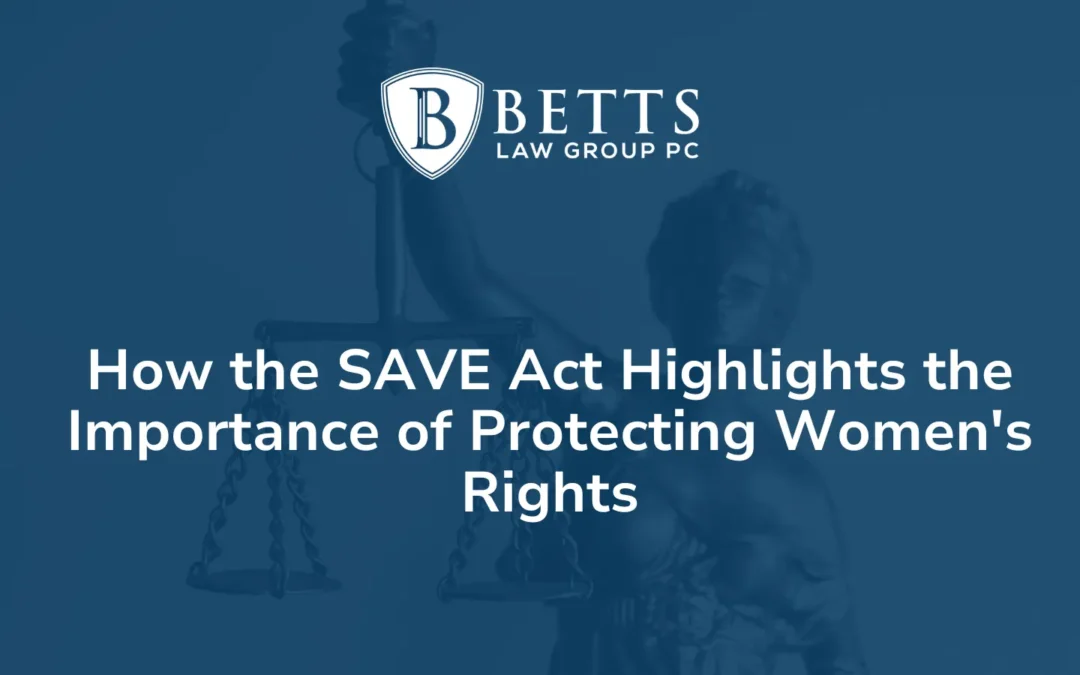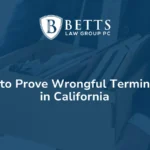The ability to vote is a key part of what makes our democracy work. In much of the United States, discussions around election integrity and voter eligibility are ongoing. The 2025 Safeguard American Voter Eligibility (SAVE) Act, while mainly focused on ensuring the accuracy of voter registration, has concerning implications regarding the rights of all eligible voters, particularly women.
The SAVE Act would require voters to show proof of U.S. citizenship (like a passport or birth certificate) in person when registering to vote or updating their voter registration. An estimated 69 million women and 4 million men in the United States do not have a birth certificate that matches their current legal name, leaving their voting status hanging in the balance.
At Betts Law Group, we understand that the fight for equality and the protection of individual rights are interconnected. Our team has extensive experience supporting individuals in California who have faced violations of their rights, including sexual assault, sexual harassment, and wrongful termination. This has made us acutely aware of how policies that may seem neutral (like the SAVE Act) can disproportionately affect the most vulnerable populations.
What Exactly is the SAVE Act?
In a general sense, the SAVE Act aims to ensure that only eligible citizens are registered to vote and that voter registries are accurate and up-to-date to prevent voter fraud. Sometimes this can include verifying voter registration information, removing ineligible voters if they are deceased or moved out of state, and creating safeguards against double voting.
The SAVE Act’s mandate for in-person proof of U.S. citizenship during voter registration could disproportionately impact women and minorities across the United States. This situation leaves their voting status uncertain and risks silencing a significant portion of U.S. women.
How the SAVE Act Could Disadvantage Women in California
Certain conditions often associated with the SAVE Act, such as stricter voter ID requirements or more frequent and aggressive voter roll purges, could negatively affect women in California and the United States. Here’s why:
- Access to Identification: Women, particularly those from marginalized communities, may face greater challenges in obtaining or updating required forms of identification because of factors like socioeconomic status, name changes after marriage or divorce, or limited access to transportation and government services in California.
- Caregiving Responsibilities: Women often bear a larger share of caregiving responsibilities, which can make it more difficult to navigate voter registration processes or have necessary documents properly updated.
- Disinformation and Obstruction: Politically motivated implementation of the SAVE Act could lead to targeted disinformation campaigns or obstructive practices that discourage or prevent women from voting.
If the SAVE Act creates unnecessary hurdles that impact women’s ability to register and vote, it could effectively silence their voices and reduce their representation in the democratic process.
The Name Discrepancy Challenge for Married Women in California
After marriage, most women in America opt to change their legal names to adopt their spouse’s surname or take a hyphenated version. However, this process can not only be tedious and time consuming, but cause their names to be different on drivers’ licenses, social security cards, and birth certificates. Name changes have to be initiated through a number of agencies in order to have the change properly documented.
Additionally, some women retain their maiden names, while others may do a combination of both, leading to a potential patchwork of names across different forms of identification, voter registration records, and other official documents.
This common experience among women could create significant hurdles under stricter voter verification measures associated with the SAVE Act:
- Mismatched Voter Registrations: If a woman registered to vote using her married name but her driver’s license or other identification still includes her maiden name (or vice versa), this discrepancy could trigger issues at the polls. Poll workers can flag these mismatches under the SAVE Act, leading to provisional ballots or even denial of the right to vote if the discrepancy can’t be resolved right away.
- Challenges with Documentary Proof: Obtaining updated identification reflecting a name change can be a time-consuming and bureaucratic process. Women with busy schedules, caregiving responsibilities, or limited access to transportation might find it difficult to get these documents updated quickly, especially if they are unaware of potential issues until close to an election.
- Inconsistent Record Keeping: Errors or inconsistencies in government databases and record-keeping systems make these issues even more difficult. A woman’s voter registration might be accurately updated, but inconsistencies in other state databases used for verification could still lead to problems at the polls.
For married women in California and across the United States, the simple act of exercising their fundamental right to vote could become unnecessarily complicated and potentially denied due to these common name-related issues created by the processes of the SAVE Act.
We at Betts Law Group support individuals who have experienced violations of their rights and stand for the equality of all Americans. If you need assistance with rights violations like wrongful termination or workplace discrimination, contact us for a consultation.





